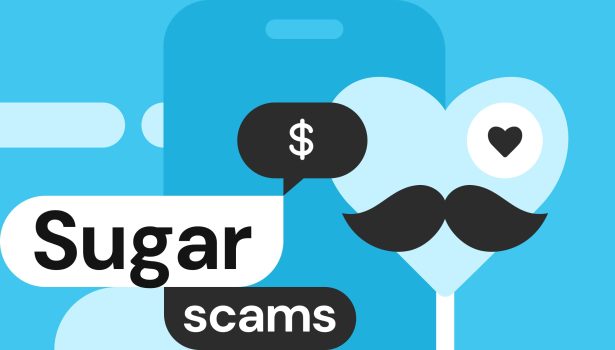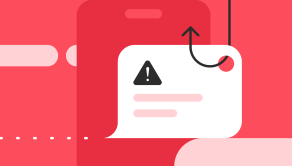How to stay away from sugar baby, sugar daddy, and sugar momma scams

Sugar relationships are generally safe when they are mutual and consensual, but as with any kind of relationship, trust is crucial. In sugar scams and their variations—sugar daddy scams, sugar momma scams, or sugar baby scams—trust is abused, and the victim ends up with nothing but their money or sensitive personal information stolen and exploited.
In this Onerep guide, you can learn about the most common variations of sugar dating scams, go through the telltale signs of sugar scammers, and learn how to protect yourself from deception, manipulation, and financial loss.
What are sugar baby, sugar daddy, and sugar momma scams?
In sugar relationships, love and money form unconventional alliances. Wealthier, typically older individuals and younger, financially dependent “sugar babies” enter a mutually beneficial arrangement, exchanging companionship—and sometimes intimacy—for financial support.
When genuine, these relationships are perfectly transactional and based on the consensual give-and-take. But they also increasingly exploited in the shady economy of scams, with more and more people falling into the trap and seeing their trust betrayed.
The goal of a sugar scam is always to get either the victim’s money or personal information, which can later be used for identity theft or financial fraud.
Sugar scams can target both wealthy older individuals and younger people in financial need. Scammers track down their targets on social media, like in Instagram scams, and dating apps. They exploit emotional vulnerability, dependency, and personal hardships, play on insecurities, and make shallow promises of intimacy or financial support that they never intend to fulfill.
How do sugar daddy and sugar momma scams work?
Sugar relationships, especially those that begin online, are fertile ground for fraud.
Sugar daddy or sugar momma scams start with a hook, where scammers—pretending to be wealthy older men (in sugar daddy scams) or women (in sugar momma scams)—seek out online relationships with younger people, typically students or gig workers in their twenties, and promise financial support in exchange for friendship or intimacy. They may offer a “weekly allowance,” emotional support, or mentorship—whatever they sense would be most appealing to their target.
Scammers often support their pitch by creating the illusion of luxury, using fake, stolen, or AI-generated photos of themselves featuring luxury cars, resorts, yachts, and designer brands.
Then comes the trap. Scenarios vary:
- Scammers may ask their target for credit card information under the pretense of sending money, directing them to a phishing link where their banking details are stolen.
- They may request a small payment or gift card to “unlock” the promised transfer or “prove” the connection is real.
- They might ask the victim to cover shipping fees for a luxury item they claim to be sending.
- If using PayPal for a money transfer, they may forge a screenshot stating there are some processing fees due, which they then ask to be covered by the recipient.
- They may send a mobile deposit check via email with instructions to send a share of the check amount back to them or to another account, such as for “charity.”
After the victim follows the instructions and sends the money or their banking information, the scammer disappears and blocks all further communication. This can happen as quickly as in one day or develop over the course of a few days or weeks, just long enough to build trust between the two before the scam takes place.
How do sugar baby scams work?
In this variation of sugar scams, scammers flip the script. Sugar baby scammers approach their wealthy older targets, offering a relationship in return for a stream of financial support and gifts. The key difference from genuine sugar babies is that they never follow through on their promises, the only thing they’re interested in is the money. Once they trick their sugar daddy or momma and get their “allowance,” they promptly disappear.
Some common hooks used by sugar baby scammers include:
- Dropping a slight financial problem from the very beginning, such as needing help to pay an overdue bill.
- Asking for a small amount of money just to keep texting.
- Claiming they’ve been scammed before and requesting a money transfer upfront as “verification” of the sugar daddy’s or momma’s genuine intentions. For this, they may suggest using gift cards or instant money transfer apps, using services like Venmo to scam you.
- If the relationship becomes explicit, they may begin blackmailing the victim, threatening to reveal the relationship unless they are paid.
Similar to pig butchering scams, sugar baby scams tend to build up over time, with the scammer investing their time and effort into establishing a seemingly genuine relationship only to gradually extract larger and larger sums of money. Another similarity with pig butchering is that the “sugar baby” may eventually ask their target to invest into a crypto scheme to “multiply their fortunes” as an act of goodwill. Once a hefty sum is invested, the scammer disappears along with the money that has been flowing into their account from the start.
Real-life sugar scam examples
Sugar scams can happen everywhere—from dating apps to Instagram, Tik Tok, Snapchat, or Discord.
The sugar baby mobile deposit fake check is perhaps one of the most common variations, where a sugar daddy or momma promises to send a mobile deposit check via email for the sugar baby to clear through their bank. The check turns out to be fake and bounces after a few weeks, sometimes months, and the victim is left with a loss in case they’ve already spent the money or even bought something with it for their sugar companion.
In a variation of this fake mobile deposit check scam, a “sugar momma” on Discord asks her “sugar baby” to clear the check she sent via email and spend part of it as her “donation to an orphanage.”
In the following example, the con sugar daddy asks his “baby” to cover the outstanding PayPal processing charges by buying cryptocurrency, in what appears to be a Cash App scam. This communication has some glaring red flags—no PayPal fees can be covered using crypto, and buying bitcoin via Cash App is a very common scamming technique, as Cash App transactions are irreversible. The scammer’s PayPal avatar is also suspicious. Overall, this scamming attempt only highlights how digital literacy can help prevent someone from becoming a victim.
Many real-life sugar scam cases share these common traits:
- They start with a stranger messaging randomly on social media or through a messaging app.
- Offers of money appear early, often in exchange for simple communication with no intimacy required.
- These are followed by supposed money transfer issues that require the recipient (the victim) to cover processing fees, send a portion of the received money to some “charity,” or buy a gift card for the “sugar partner.”
- If the “sugar baby” refuses to follow the instructions, the scammer may escalate the communication quickly—even resorting to threats.
How to spot a fake sugar daddy, sugar momma, or sugar baby
Every relationship is a leap of faith, but trusting a sugar scammer can be costly and damaging. Luckily, there are telltale signs of sugar scammers that can help you spot them and avoid falling for their fake promises.
The typical red flags of a sugar daddy scammer or a sugar momma scammer include:
- Offers of money without meeting in person.
- Pushing for credit card information or money transfer apps early.
- Avoiding video calls and in-person meetings.
- Asking you to send a “fee” or a gift card as a sign of loyalty to release their payment.
- Using fake money transfer screenshots that claim the recipient needs to cover a “processing fee” to unlock the transfer.
- Offering to send a mobile deposit check or asking you to use their banking information to buy something for yourself (the banking details are likely stolen, and the check is fake).
Sugar baby scammers typically show the following characteristic traits:
- Developing emotional intimacy quickly.
- Using excessive flattery and love-bombing techniques to overwhelm you.
- Pushing for money early, without meeting in person.
- Giving endless excuses to delay the meeting.
- Telling stories of financial emergencies that need to be resolved immediately.
Some general signs of a sugar scammer include:
- Using generic or scripted messages that sound impersonal, such as repeating “I want to spoil you,” and referring to the person as hun, gorgeous, beautiful, etc. without ever using their name.
- Poor grammar and rambling messages with no punctuation, often featuring a “stream of consciousness” style and complicated excuses for why they need your money.
- Posting photos that look overly curated, polished, or AI-generated.
- Having a new or underdeveloped online account with minimal or no followers, friends, or posts.
You can ask some revealing questions to check if your sugar partner has genuine intentions:
- “Can we hop on a quick video call before we talk allowance?”
- “How do you usually arrange things safely?”
- “Are you okay signing a little agreement after we meet?”
Your partner’s reaction to any of these is likely to reveal their true intentions, helping you distinguish a scammer from someone interested in a real sugar relationship.
How to protect yourself from sugar daddy, sugar momma, and baby scams
The key recommendation for protecting yourself from fake sugar daddy, momma, or baby setups is to use a secure sugar dating platform like Seeking or Sugarbook. Both platforms have moderation and user verification policies in place to protect their members from scammers. However, not all potential scammers are blocked from slipping through, so your discretion and vigilance remain essential to distinguish a scammer from a genuine sugar partner.
Regardless of the platform, take these precautions to avoid falling for sugar scams:
- Never send money before meeting in person or at least via a video call. Verifying your sugar partner’s identity is essential to building trust as a foundation for a genuine relationship. A refusal to go on a date or video call is a major red flag.
- Never send money to “unlock” their payment to you. No genuine sugar daddy or momma act this way, so this is a prime sign of a scam.
- Don’t trust payment confirmation screenshots. These can easily be forged, especially by scammers claiming you need to cover PayPal “processing fees.”
- Do background checks. Your financial security is at stake, so due diligence is critical. Reverse-search their profile images to check originality, and browse their social media accounts for consistency. If they have no online presence aside from chatting with you, it could be a sign of a Telegram scam or a Signal app scam—these platforms often attract romance scammers who exploit their anonymity.
- Set boundaries early. Some anti-scam tactics include refusing to send money without real-life identity verification and cutting off communication if they push your limits, use pressure, scare tactics, or threats.
- Protect your personal information. Never share private details with a stranger—and online sugar partners are strangers unless you’ve met them in real life. Be especially cautious if they ask you to send them your bank card details, Social Security number, home address, or personal documents.
- Know how sugar scammers manipulate victims. They often exploit financial desperation, loneliness, low self-esteem, and the desire for love and admiration. If you sense emotional manipulation, end communication—it could be an early sign of a sugar scam.
- Keep your communication discreet. Unless you know the person can be 100% trusted, never share images or messages that you would feel uncomfortable sharing publicly.
Have you fallen for a sugar scam? Take these steps
Sugar relationships carry a certain social stigma, which can make it difficult for victims to admit they’ve been scammed by a sugar daddy, momma, or baby. Reporting a sugar scam can feel shameful for many, especially those who’ve been tricked into sending money or sharing their bank details.
The first step for sugar scam victims is to realize that any scam is a crime, and they’re entitled to protection just like any other fraud victim.
There are a few leverages available:
- Report the sugar scammer’s account to the respective platform. Whether you met on Instagram, Seeking, or Sugarbook, you can report the scammer there to help prevent them from targeting other users.
- Immediately stop all communication and block them. Give the scammer no further opportunity to exploit your relationship. Even if they start getting aggressive and threaten to reveal everything to your family or claim they know where you live, these are likely just pointless threats, especially if your communication was solely online.
- Collect evidence. Take screenshots and save your conversations as proof. This can be crucial when reporting the scam to police or anti-fraud organizations.
- Report the scam to the Federal Trade Commission if you’re based in the U.S.
- Inform your bank or card issuer if you shared your financial details with the scammer.
- Involve your local law enforcement. This is essential if you’ve lost money or are concerned about personal threats.
- Set up identity protection monitoring if you believe your personally identifiable information, such as your national ID or Social Security number, could be used for identity theft.
Finally, if you ever decide to continue seeking a sugar relationship, browse related forums on Reddit, Quora, etc. to educate yourself on scammers’ behavior, and remember to trust your intuition: if something feels off, it is.
Stay safe from sugar scams and other online threats
Scammers prey on publicly available information about their targets, such as full name, home address, phone number, email address, and relatives. They can exploit this information to make you feel like they know you, and manipulate or blackmail you if you refuse to play along.
They typically find this information through a simple online search on Google or through dedicated people-search websites that store millions of unsolicited records about individuals.
Onerep adds a powerful layer of defense against online scammers by removing your personal records from 210+ data brokers and people-search websites. This reduces your visibility to scammers who are looking for targets online, prevents them from inventing emotionally manipulative stories using relatable details, and helps you control your digital footprint, so your information is only publicly available with your consent.
FAQs
How do sugar daddy scams work?
Sugar daddy scammers pose as wealthy older men offering financial support in exchange for online relationships. The twist is that they eventually require their “sugar babies” to send money in the form of “verification fees,” PayPal processing fees, or gift cards to prove their loyalty and release the promised payment. After receiving the money, the scammer disappears.
Are sugar momma offers on social media legit?
Almost always no. Sugar momma scams are common on Instagram, Twitter/X, Facebook, and Discord. Similar to sugar daddy scams, “mommas” will at some point ask for money or a gift card, request you to clear a mobile deposit check, or ask you to donate to a “charity.” Real sugar arrangements are built on trust and are usually initiated on reputable sugar dating platforms, not randomly via DMs.
Can someone steal my info with a fake mobile deposit?
You are very likely to lose money if you deposit a fake check. This is a common fake check scam where the scammer sends you a check to clear, it later bounces, and any amount spent is deducted from your actual balance. If you share your bank login information with the scammer, they can also steal and exploit it.
What should I do if I have sent money to a sugar scammer?
You should act promptly to protect your finances and identity. Report the scammer to the platform where you communicated and to the FTC (if you reside in the U.S.). Contact your bank or payment card issuer to report the scam and set up fraud alerts. Consider signing up for an identity theft monitoring service to track any misuse of your sensitive information.
How do I report a sugar scam?
You can report a sugar scam to the Federal Trade Commission (in the U.S.), your local law enforcement agency, your bank or payment provider (if involved), and the platform where you met the scammer. Reporting helps prevent further harm, though it doesn’t guarantee recovery of stolen funds or prosecution of the scammer. Still, it’s essential for legal authorities to trace online scams and help stop them from happening again.





Mikalai is a Chief Technical Officer at Onerep. With a degree in Computer Science, he headed the developer team that automated the previously manual process of removing personal information from data brokers, making Onerep the industry’s first fully automated tool to bulk-remove unauthorized profiles from the internet.